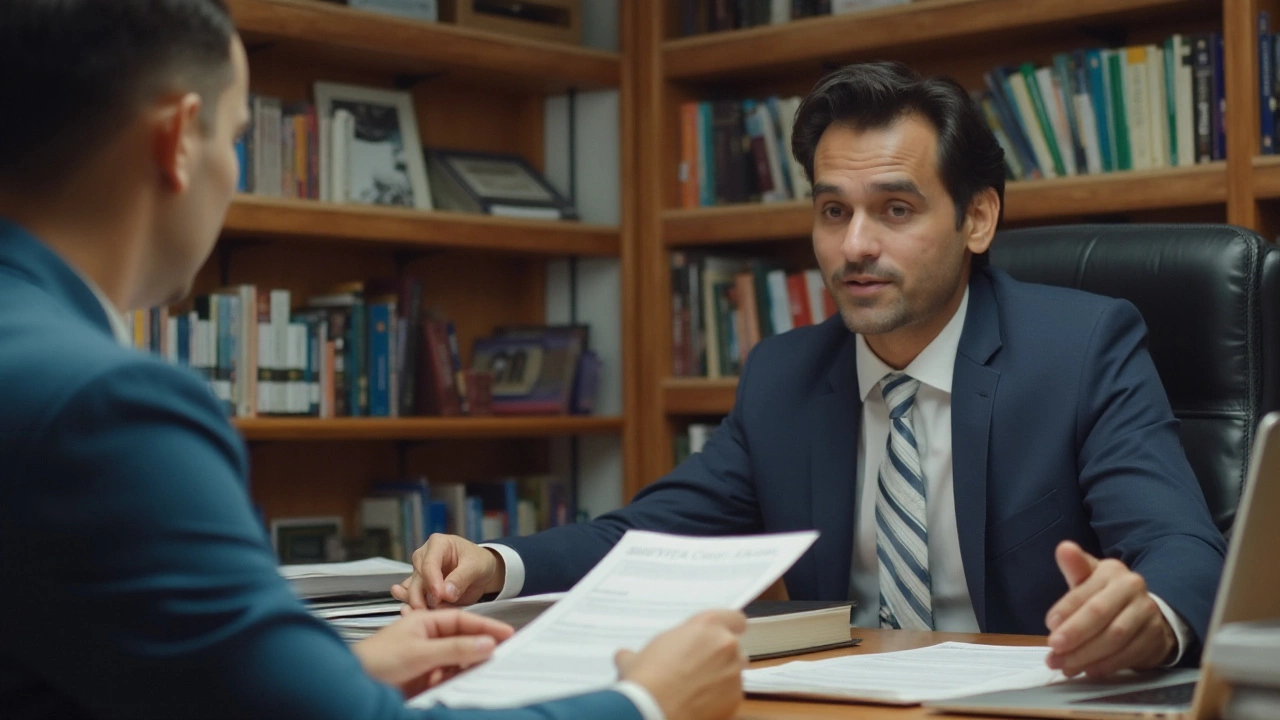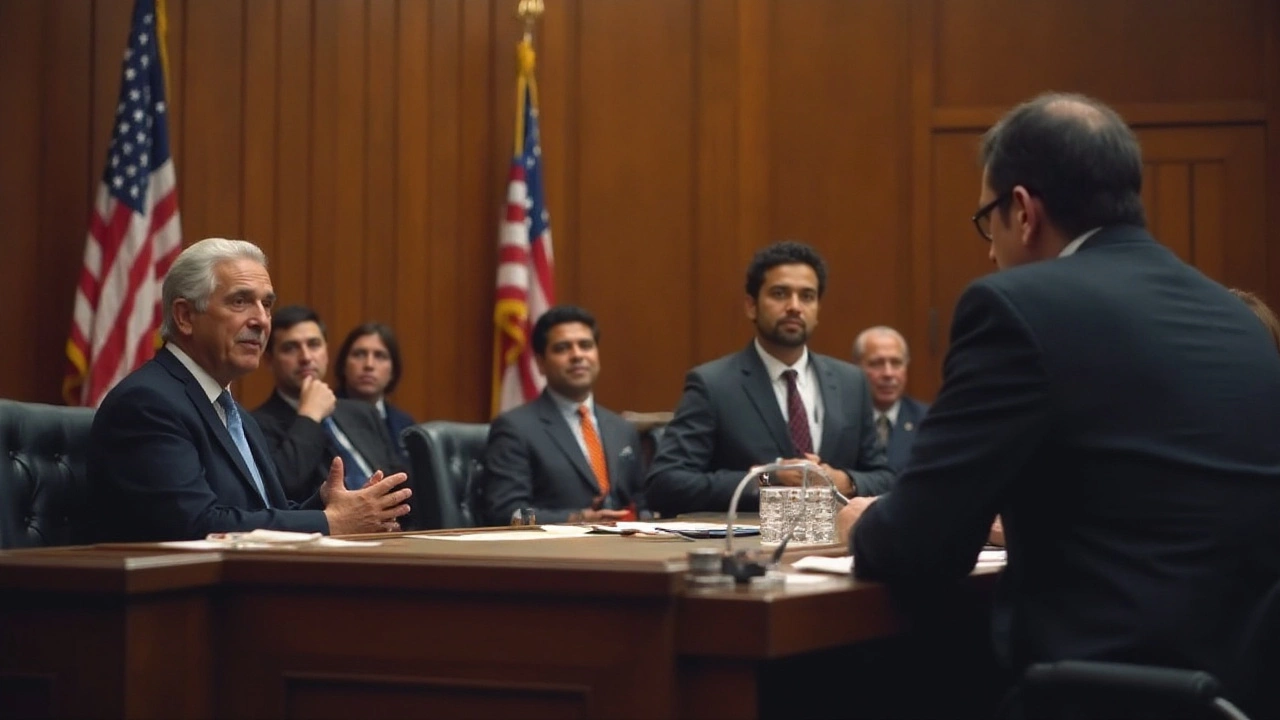Finding yourself in need of a criminal lawyer can be a stressful experience, compounded by the question of how much this legal aid might cost you. While it's important to secure proficient legal representation, it's equally crucial to understand the financial implications involved.
Throughout the United States, the expenses associated with hiring a criminal lawyer can vary significantly, influenced by numerous factors including the complexity of the legal issues at hand, the lawyer's own experience and reputation, and the location where services are provided. Such variability necessitates a closer look at how these costs are determined and some special tips on how one might manage these expenses effectively.
This guide aims to shed light on the intricacies of criminal lawyer fees, providing a clearer perspective to help you navigate these crucial decisions with confidence and clarity.
- Factors Influencing Lawyer Costs
- Typical Fee Structures
- Geographical Impacts on Fees
- Tips for Finding Affordable Legal Services
- The Importance of Experience and Specialization
- Negotiating and Understanding Your Legal Bill
Factors Influencing Lawyer Costs
Engaging a criminal lawyer might feel daunting, particularly when considering the broad range of costs associated with legal representation. Several key factors contribute to how these fees are structured, and understanding them can significantly aid you in making an informed decision. One primary factor is the experience and reputation of the attorney. A seasoned lawyer, often perceived as more adept in dealing with complicated cases, usually commands higher fees. Clients often pay for their expertise, refined over years of practice, which can be invaluable during high-stakes negotiations or trials.
Complexity of the case is another crucial determinant. A straightforward misdemeanor may not require as much time or legal wrangling as a more layered felony charge. The intricacies of your case will directly affect the amount of time your lawyer needs to dedicate, thereby influencing the cost. Cases involving additional elements like multiple defendants or technical forensic evidence can inflate costs accordingly. Lawyers might have to bring in specialists or experts, further increasing your legal bill.
Geographical location also plays a significant role, as legal costs fluctuate widely depending on where the services are rendered. For instance, legal professionals in large metropolitan areas often charge more due to high demand and higher living costs. Conversely, in smaller towns, one might find more affordable representation. Another important dynamic is the size of the law firm. A large firm with numerous resources might offer a more comprehensive service but typically at a higher price due to its overheads, compared to a smaller firm or a solo practitioner.
According to a report from the National Association of Criminal Defense Lawyers, "Research indicates that a significant percentage of lawyers' costs are influenced by external economic factors, making it crucial for clients to understand the financial landscape of their locality."
A respectable source says, "In urban areas like New York or San Francisco, you might expect to pay premium prices for any legal service due to competitive environments and higher typical living costs."Client involvement can also affect costs. The more information and resources you can provide to your attorney, the less time they may need to spend gathering facts on your behalf, potentially lowering the overall fees. By staying organized and responsive, clients can sometimes economize.
To help you navigate these factors rationally, here is a simple table illustrating how different elements might impact costs:
| Factor | Impact on Cost |
|---|---|
| Lawyer's Experience | High |
| Case Complexity | Variable |
| Geographical Location | Moderate to High |
| Firm Size | Low to Moderate |
| Client Involvement | Potentially Cost-saving |
By comprehending these key factors, you're better positioned to explore your options and negotiate effectively with your prospective defense attorney. This understanding can empower you to seek the necessary legal aid without unforeseen financial pitfalls.
Typical Fee Structures
When it comes to hiring a criminal lawyer in the United States, understanding the typical fee structures can save you a lot of confusion and, potentially, money. Generally, criminal lawyers charge their clients in one of three ways: hourly rates, flat fees, or retainers. Each of these structures comes with its own set of considerations, and it's crucial to understand what you're getting yourself into before signing any agreements.
Hourly rates are perhaps the most straightforward type of legal billing. This fee structure essentially involves the lawyer tracking their time on an hourly basis and billing you for each hour they spend on your case. Rates can vary significantly based on location and experience, but they can range from $150 to more than $700 per hour. Experienced and specialized lawyers often charge more, reflecting their expertise and the complexity of the defense they can provide. Clients find this structure appealing because it allows them to pay as they go, which can be crucial if the legal proceedings occur over an extended period. However, the downside is that costs can add up quickly and unpredictably, especially with a complex case.
On the other hand, flat fees offer a way to predict the cost of hiring a lawyer. This means the defense attorney charges a fixed rate for the entirety of a case. Flat fees are more common in cases where the lawyer has a clear understanding of the work required to achieve a resolution. They're often used for less complex cases like misdemeanors or cases that will likely end in a plea deal. The benefit here is the clarity it provides; you know ahead of time exactly what you'll be paying. However, it's important to have a clear agreement on what the flat fee covers, as additional costs can occasionally arise for unforeseen work.
Retainers are another common option, especially in prolonged or unpredictable cases. A retainer functions like a deposit that the lawyer draws from as they work on your case. It's a prepayment by the client to ensure the lawyer's availability when needed. The retainer amount is usually based on an estimate of the total expected case costs. This can be an ideal structure for ongoing cases or when the scope of work is uncertain. It's essential, though, to regularly review your retainer balance and any invoices provided to avoid surprises.
For those wondering about the best approach to take, it’s wise to have an open conversation with potential lawyers about their billing practices and what each fee structure involves. This transparency can prevent unexpected financial strain.
According to Steven Krieger, a Virginia-based attorney, "Being upfront about expectations regarding fees isn't just important, it's necessary to establish a trusting client-attorney relationship." This sentiment is echoed across the legal community, highlighting the importance of clarity and communication when it comes to legal fees.
No matter the fee structure, always ask for a detailed explanation of services included and keep communication channels open with your attorney. This understanding can not only reinforce trust but also ensures that you're getting the most value from legal services.

Geographical Impacts on Fees
The cost of hiring a criminal lawyer in the United States often reflects more than just the complexity of the case or the skill of the attorney. Where you are seeking legal assistance plays a pivotal role in how much you might end up paying. It’s no secret that living costs and the economic environments of different regions directly influence the pricing of legal services, and criminal lawyer fees are no exception. Urban areas, particularly those bustling with high living costs like New York City or San Francisco, often see significantly higher legal fees compared to more rural settings or smaller towns. This disparity is generally influenced by the overall demand for legal services, the cost of running a law practice in these areas, and the prevalence of certain types of cases that might require specialized knowledge.
Consider, for instance, a scenario where the same criminal charge is faced in both Los Angeles and a small town in the Midwest. In Los Angeles, the fee for legal representation might range anywhere from $300 to $700 per hour, attributed to its dense population and the high competition law firms face to maintain prestigious reputations. In contrast, a smaller town may see fees dipping as low as $150 per hour, reflecting smaller firm sizes and lesser economic pressures. According to a 2021 survey by Clio, a leading legal software company, law firms in big cities reported hourly rates nearly 50% higher than those in smaller towns. Such statistics underline the geographic variation that can considerably affect what clients pay for legal defense.
Interestingly, it's not just the size or wealth of an area that influences this financial aspect. Regional laws, cultural attitudes towards crime, and even the presence of local law schools contributing to the number of attorneys in practice can also shape these costs. For instance, southern states might showcase different legal rate trends compared to the Northeast or West Coast due to such factors. An important tip for anyone looking to hire a defense attorney is to research the typical costs associated with legal services in their specific location, ensuring the fees they anticipate align with local norms.
"Understanding the geographic influence on legal fees helps individuals make smart, informed decisions," remarked Susan Richards, a legal consultant with over two decades of experience advising law firms across the country. "It's not just about finding an affordable lawyer, but finding the right one willing to work with you within your budget, knowing their fees are often a reflection of various unseen factors."
If you are seeking to lower your legal costs, consider exploring neighboring regions where lawyer fees might be more competitive. As market dynamics can fluctuate based on jurisprudential demands and the standard of living, what you pay could largely benefit from a bit of geographical flexibility. Understanding these impacts and being open to crossing regional lines for your legal needs might just secure you a criminal lawyer adept at both representation and managing costs efficiently.
Tips for Finding Affordable Legal Services
Securing affordable legal services when faced with criminal charges doesn’t have to be an insurmountable challenge. It starts with tapping into local resources and expanding your search horizons. Begin by researching and reaching out to legal aid organizations in your area. Many communities have agencies dedicated to providing legal assistance to those who need it most. These organizations often work with volunteer lawyers willing to offer initial consultations either for free or at reduced prices. They can guide you through the basic understanding of your case and provide direction on how to proceed without excessive financial burden.
Beyond legal aid groups, consider approaching law schools in your vicinity. Law schools typically run clinics where aspiring lawyers work under professional supervision. While these services might not completely replace hiring a seasoned criminal lawyer, they provide a stellar opportunity to receive competent legal advice for nominal fees. This can especially be helpful for cases that might not require an advanced legal strategy or for getting advice on navigating the system effectively.
“Justice delayed is justice denied. Seek assistance early to avoid complications and additional costs.” — Local Advocacy Group.
Another intriguing approach is to explore the option of unbundled legal services. This fee model allows clients to hire a lawyer for specific parts of their case, rather than having them handle the entire matter start-to-finish. For instance, you might need a lawyer only to draft certain documents or to prepare you for a court appearance, which reduces the cost compared to full representation. While taking this route, it’s important to communicate clearly about the scope and expectations to avoid unforeseen charges.
Conduct ample research online to find reviews and recommendations on affordable lawyers who specialize in criminal law. Websites that focus on legal advice forums can offer insights from various individuals who faced similar legal challenges. Social media platforms often host groups and pages dedicated to legal assistance and advice, where members exchange personal experiences regarding affordable legal options. However, always verify the credibility of any person or service before engagement.
Lastly, don’t underestimate the power of negotiation. Many defense attorneys may be willing to discuss payment plans that ease the burden on your finances. It never hurts to ask if they can offer a sliding scale fee structure based on your income. Always get any agreement in writing to ensure transparency and accountability. By employing a mix of these strategies, you can make well-informed decisions without compromising on the quality of your legal defense.

The Importance of Experience and Specialization
When it comes to criminal defense, the experience and specialization of a lawyer can make a significant difference in the outcome of a case. An experienced attorney brings a wealth of knowledge gained through years of practice and numerous trials. This experience is invaluable when navigating the complex corridors of the justice system. These lawyers have honed their skills in understanding legal precedents, engaging with prosecution, and negotiating plea deals, which often leads to better results for their clients. Specialization adds another layer of proficiency. A lawyer focused on criminal law as opposed to a general practitioner has likely encountered a wide array of cases similar to yours and knows the nuanced strategies that can tip the scales in your favor.
Specialization often involves extensive study and continuous learning as criminal laws evolve. This dedication ensures that specialized lawyers are up-to-date with recent changes in the law, novel defenses, and fresh tactics, all of which are crucial for a robust defense strategy. Choosing a criminal lawyer who specializes in areas pertinent to your situation, such as DUI charges or white-collar crimes, can ensure that your defense is both comprehensive and strategic.
In the legal profession, a sterling reputation is built over time through successful case outcomes and professional acknowledgment. Experienced criminal attorneys often garner respect not only within their firms but amongst peers and courtroom personnel. This can come in handy during negotiations or if a judge knows the lawyer's standing as an honest and competent professional. "An experienced defense attorney can leverage relationships formed in courtrooms over decades to advocate more effectively," as stated by Robert Carlson, a former president of the American Bar Association.
When weighing the cost implications, it may seem tempting to hire a less-seasoned or cheaper lawyer. However, this often comes at a greater overall risk to your case, potentially escalating future costs in terms of harsher fines, longer sentences, or loss of professional reputations. Opting for a skilled attorney who commands higher fees can often be a sound financial decision. For instance, a lawyer with substantial trial experience might resolve a case more quickly, saving money on prolonged court proceedings and reducing stress.
A reputed study found that defendants represented by private lawyers experience slightly better outcomes statistically than those using public defenders. In Table 1, we summarize a few key findings related to the benefits experienced with specialized legal counsel:
| Outcome | Public Defender | Private Lawyer |
|---|---|---|
| Case Dismissal | 15% | 25% |
| Plea Bargain | 50% | 60% |
| Conviction Rate | 80% | 70% |
While experience and specialization might not offer absolute guarantees, the advantages they provide heighten the probabilities of achieving a favorable outcome significantly. It’s paramount for those involved in legal issues to wisely evaluate these factors, enabling a choice that aligns with their best interests while considering the financial stakes involved. In the nuanced world of law, the right experience often holds the key to unlocking a better future.
Negotiating and Understanding Your Legal Bill
When it comes to navigating the often-complex realm of legal billing, negotiation and understanding are key elements that can significantly ease financial burdens. The costs associated with hiring a criminal lawyer aren't set in stone and there's often room for discussion. Start the conversation early in your engagement with legal counsel. It's crucial to establish clear expectations and to ask your attorney to outline their preferred method of billing, whether it's hourly, a flat fee, or a contingency arrangement. This proactive approach helps in dispelling uncertainties and gives you the control to manage the financial aspect of your case more effectively.
Once you know what you're dealing with, inquire about what's included in the proposed fees. Some lawyers might charge separately for certain expenses such as court filings, subpoenas, or even paralegal work. Clarifying these details upfront can prevent surprises down the line. Be prepared to ask about payment plans—many attorneys are open to providing a structured method of payment, which can help to alleviate the pressure. As it turns out, according to the American Bar Association, about 30 percent of clients are successful in negotiating better terms or at least gaining a more detailed understanding of their bills when they proactively engage with their legal representation.
"It's always in the client's best interest to take an active role in understanding and negotiating their legal fees," says Laura Smith, a seasoned legal consultant. "Too many people assume they have no leverage, but transparency is a hallmark of a responsible attorney-client relationship."
Another critical factor is familiarizing yourself with the recurring terms that appear on your legal bills. Knowing the difference between billable and non-billable hours, understanding disbursements, and seeing how each activity is categorized can shed light on where your money is being allocated. This understanding can equip you to question any charges that seem inflated or unjustified. Ask your lawyer for a detailed breakdown and be persistent in seeking clarity on contested items until you're satisfied with the explanations given.
Negotiating costs isn't merely about cutting fees—it's also about making sure you're getting value for your payment. Go through the billing statement line by line, looking for ambiguities and errors. Don’t hesitate to ask for documented evidence of the time spent on your case. There's often room for revisiting and adjusting these details to fairly reflect the work done, especially if you notice your legal costs are mounting faster than anticipated. Additionally, some lawyers might offer discounts for early payment or agreeing to retain their services long-term, which could result in reduced hourly rates.
Finally, always remember that traveling this path allows you to develop a deeper, more trustworthy relationship with your attorney, one that is built on mutual understanding and respect. Don't shy away from engaging in this conversation—your lawyer not only expects it but respects clients who seek to be well-informed. By doing so, you're ensuring that your investment in a defense attorney is not only safeguarded but strategically aligned with your financial capabilities and legal needs.


